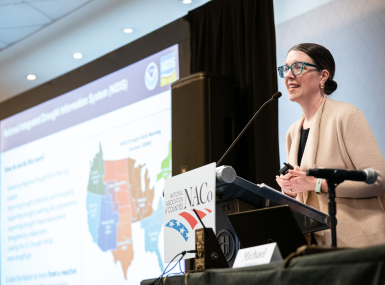Meet the candidates 2024: George Dunlap
Upcoming Events
Related News

George Dunlap
Chair, Board of County Commissioners
Mecklenburg County, N.C.
Why are you interested in serving as a NACo officer?
Throughout my sixteen years as a NACo member and commissioner, which includes six years chairing my county board I believe there is no greater institution to represent the needs and work of counties across this country. My goal in serving as the 2nd Vice President is to support the national leadership in the pursuit of achieving our priorities using my decades of experience that includes the following.
Current Chair, Mecklenburg County Board of County Commissioners
North Carolina Association of County Commissioners (NCACC) Board of Directors
NCACC Current Chair, Health and Human Services Steering Committee
NCACC Former Chair, Justice and Public Safety Steering Committee
NACo Current Chair, Justice and Public Safety Policy Steering Committee
NACO Former Vice-Chair, Large Urban County Caucus
NACo High-Performance Leadership Academy
Having served NACo in various roles of local, state, and regional leadership as well as testifying before Congress for NACo’s priority platforms I have been able to build bridges and foster relationships to accentuate collaborative advocacy aligned with our mission to “Strengthen America’s Counties.”
This front row seat has shown me that, while every county faces its own set of goals and challenges, that there are collective truths in our service and efforts to address the critical needs in our communities. I am eager to share my knowledge, experience, and expertise but I also welcome learning from our members, creating new relationships and moving the NACo work forward.
What do you consider to be the two or three most important challenges facing NACo in the near future on which the Officers/Executive Committee/Board of Directors should focus? Why?
NACo must continue to stand together to ensure our collective voices are heard with policymakers and all layers of government. Our unified voices and experiences are a compelling story of what’s happening in our country. If I am fortunate enough to be elected to serve NACo as an executive officer, I am committed to working with fellow officers, the executive committee, the board of directors, and the NACo staff to address challenges that may be faced. While it is important to anticipate challenges, it is also important to remain flexible and adaptable to those challenges that are thrust upon us. I am up to that task. In addition to the challenges identified in the recent NACo survey, additional upcoming challenges may include:
Housing
The affordability and availability of housing across the country remains a significant concern. The number of housing units to population ratio has remained stagnant since 1980, while the rate of housing construction has still not fully recovered since the housing market crash and financial crisis in the 2000s and affordability decreased, exacerbated further by the COVID-19 pandemic. Whether it’s here at NACo, or in Congress or within the Administration, officials recognize the need to increase housing stock and ensure that families and individuals have the ability to purchase a home without tremendous financial burden. This is an issue that affects urban and rural counties, and I applaud the work of NACo’s Housing Task Force. I believe it is imperative for NACo to continue advocating on behalf of counties for the federal government to prioritize and play a more active role in addressing the existing housing crisis – as we know, low affordable housing availability is a step removed from homelessness. The recent bipartisan, bicameral tax deal that expands the Low-Income Housing Tax Credit is a positive step forward, but funding for housing programs in the federal budget and availability of overall resources must be prioritized and increased for progress to continue.
Resiliency
In 2023, twenty-eight natural disasters including flooding, hurricane, wildfire, and other severe weather events occurred in our country. Those events resulted in $1 billion dollars or more in costs, the highest number of billion-dollar disasters in a calendar year to date as high-cost disasters have continued to skyrocket and increase in frequency and scale in recent years. Regardless of a county’s location or size, resiliency in the form of risk assessment, emergency planning and preparation to better prepare against natural disasters and severe weather events is a crucial and ongoing challenge for communities to protect public health, economy, and crucial infrastructure. While there has traditionally been strong support from the federal government for post-disaster mitigation efforts through Stafford Act disaster declarations and public assistance, emphasis must be placed on pre-disaster mitigation strategies. NACo must continue to work with Congress and partner with federal agencies to ensure increased funding for FEMA grant programs as well as create new opportunities and incentives that remove barriers and allow all counties equitable access to these resources.
Economic Development
Counties are in a unique position to help spur development of new technological innovation and advancement that promote economic growth. Whether it is through the improvement of broadband access to promote digital literacy or the establishment of new workforce development training programs to support workers in changing industries such as Artificial Intelligence (A.I.), counites have and will continue to partner with the Department of Labor, Economic Development Administration (EDA), and other agencies to serve as incubators for these new opportunities. With the passage of the CHIPS and Science Act, Congress and the Administration have signaled their interest in technological investments and U.S. competitiveness, and it will be important for NACo and counties to advocate for federal resources through the WIOA reauthorization, appropriations process, and other avenues to ensure that counties have access to available resources to create an environment conducive to technological innovation and economic development.
What do you consider to have been your most important contributions to the National Association of Counties to date? What do you consider to have been your most important contributions to your state association of counties?
At the national level, I have championed NACo’s priorities at every opportunity. I am proud to have directly contributed to a multitude of NACo committees to shape policy in areas of housing, mental health, workforce development and public safety initiatives. I have also been honored to facilitate numerous sessions at the NACo National Conferences. A specific contribution was my congressional testimony on behalf of NACO before the Committee on Homeland Security Subcommittee on Emergency Preparedness, Response and Recovery. During my remarks, I advocated for the following:
Ensuring federal programs provide communities with the tools and flexibility necessary to address issues specific to their jurisdiction is to improving our nation’s overall resilience
Removal of barriers to funding and resources for underserved and disadvantaged communities by providing adequate technical assistance and decreasing paperwork
The role of county officials as effective stewards of federal investments, and a strong intergovernmental partner to meet the entirety of our public sector responsibilities.
At the state level, I have worked for many years on legislative initiatives to preserve local funding and authority, oppose unfunded mandates or reductions in local authority. As former chair of the state association’s Justice and Public Safety Steering Committee, I am proud to have leveraged my background of twenty-seven years in law enforcement, fourteen years on the school board and sixteen years as a county commissioner to work on juvenile justice reform in our state. As the current chair of the Health and Human Services Steering Committee I am excited to support the long awaited Medicaid expansion for our state, which was a legislative priority for the state association and my county.
What measures would you recommend to increase and retain NACo membership and to encourage broad participation in NACo by elected officials and employees of NACo member counties? What specific role would you be willing to assume to help build and sustain membership in NACo?
A key issue facing NACo’s leadership is how to ensure that we are equally advocating for the unique priorities of both our rural and urban members, while also cultivating bipartisan support for direct federal investment in counties. This is important because our diverse priorities are instrumental in moving our organization forward. As NACo navigates a national atmosphere in this election year that has the potential to be divisive, we will need strong collaboration and relationship building skills that reach across urban and rural counties, political parties, and other varying interests. I will personally commit to working with other leaders to identify and advocate commonalities that bring members together during what could be challenging political times.
In large part, the strength of the National Association is derived from three main areas: Inclusivity, Convening, and Collaboration. If NACo continues to hold true to these basic values, we will remain on the right path to grow and retain membership. As a nationally trusted policy and education resource organization, we must be open to all member ideas and viewpoints. We must allow convening opportunities that foster constructive and civil discourse where members can be heard. And we must continue to identify county centered issues that have broad appeal that will allow our members to collaborate and achieve successful outcomes.
If we continue to follow these values, we will enhance our organizational credibility and create the space to build stronger and more meaningful relationships. In my experience, in working with various organizations, it is the personal relationships and personal outreach that have provided the greatest long-term impact to grow and strengthen membership participation. As a NACo executive officer, I will be committed to engaging with current and potential members as well as strategic outside partners to enhance and maintain those critical relationships.
Related News

Information-sharing bill could protect court workers
The Countering Threats and Attacks on Our Judges Act could provide more than 30,000 state and local judges with access to security assessments, best practices and a database of threats made against colleagues in the justice field.
Next step on PILT requires more outreach
Facing headwinds on making PILT funding permanent, county veteran Rep. Celeste Maloy (R-Utah) told county officials to reach out to any member of Congress who will listen.

NOAA outlines help for counties navigating drought’s growing risks
In April, the National Integrated Drought Information System will launch the Mid-Atlantic Drought Early Warning System, which will help county officials allocate resources and attention to mitigate drought-related disasters.
County News
Los Angeles County expands voting options for incarcerated residents
Los Angeles County provided in-person voting for incarcerated individuals awaiting trial.
